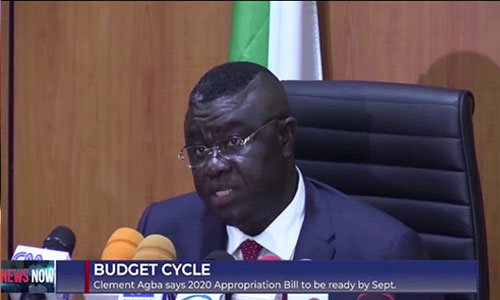THE EXECUTIVE 01/04/2022
Minister: Non-Oil Sector Contributed 70% Of N6.4t Tax

Nearly 70 per cent of the N6.4 trillion tax revenue collected in 2021 by Federal Inland Revenue Service (FIRS) came from non-oil sector, Minister of State for Budget and National Planning, Clem Agba announced yesterday.
Speaking at the FIRS Annual corporate retreat held in Lagos with the theme: “Consolidating on the Gains of the FIRS Reforms: 2019 to Date”, he said the theme for the retreat is rather apt as it should serve as an opportunity for self-appraisal in terms of meeting set goals, achievements and challenges with a view to developing strategies for future and better performance.
“I am optimistic that the ideas and resolutions that will emanate from this retreat would go a long way in proffering policy options for the government in tackling current fiscal challenges,” he said.
The minister said the revenue profile of the government has been seriously challenged in the recent past due to multiple factors.
“Given that resources are relatively low compared to the huge responsibilities of the government, concerted efforts are required at this juncture to prioritize government expenditure as well as place emphasis on resource mobilization. In this context, the task of improving Nigeria’s tax revenue collection and funding position is urgent and it is a task that must be done without fail,” Agba said.
He said that recent happenings in the global economy is compelling nations to shift from dependence on resource wealth, particularly hydrocarbons to more innovative sources for revenue mobilization.
“As the campaign for cleaner energy gains momentum and widespread support, it is resulting into lower new investments in exploration and production activities in the upstream petroleum industry. For instance, aggregate investment declined from $525 billion in 2019 to $341 billion in 2021 while investment in wind, solar and other renewable sources is soaring,” he said.
Agba said the Federal Government has put in place the Strategic Revenue Growth Initiative (SRGI) and the annual Finance Act to mobilize domestic funds necessary for human capital and infrastructure development that are both drivers and enablers of sustainable economic growth and development.
“The SRGI is designed to improve government revenue and entrench fiscal prudence with emphasis on achieving value for money. In this regards, a total of 47 Strategic Revenue Growth Initiatives were identified across three Thematic areas to achieve sustainability in revenue generation, identify new revenue streams and enhance the enforcement of existing ones as well as achieve cohesion in the revenue ecosystem,” he said.
He said the plan seeks to invest massively in infrastructure, ensure macroeconomic stability, enhance the investment environment and improve on social indicators and living conditions of the people.
“Specifically, the Plan aims to generate 21 million full-time jobs and lift 35 million people out of poverty by 2025 thus setting the stage for achieving the president’s commitment of lifting 100 million Nigerians out of poverty in 10 years,” he said.
Also speaking, President, Chartered Institute of Taxation of Nigeria (CITN), Adesina Adedayo, said the Federal Inland Revenue Service has surpassed its revenue collection target in 2021.
“I implore you all not to relent in your efforts towards ensuring that your mandate in improving the revenue generation in Nigeria is optimally achieved for a better economy. Without doubt, taxation have proven to be a veritable tool for sustenance of economies both in developed and developing countries. It is imperative to appreciate the role of taxation and strive to improve the system of administration and collection for a positive outcome,” he said.



